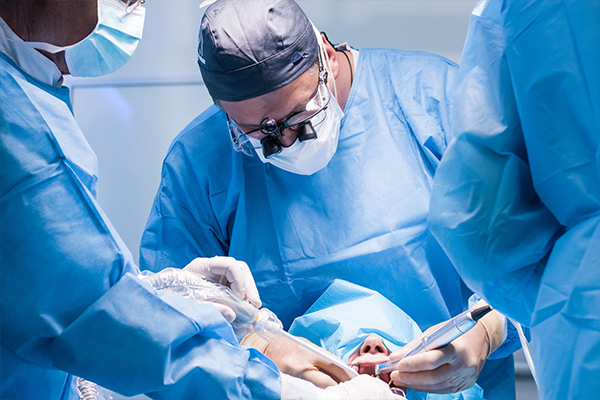


Bone grafting is sometimes necessary for dental implants, depending on the integrity of your jawbone. Over time, the jawbone in the area where there are missing teeth begins to deteriorate and atrophy. Given enough time, it will reach a state where there isn’t enough bone of good enough quality to have dental implants placed. In those situations, patients are not candidates for implants but require bone grafting.
We have the ability to grow bone where it’s necessary. This will restore the jawbone enough to allow us to place implants that are properly sized, as well as restore complete functionality and appearance to the jaw.
Before the procedure occurs, we’ll need to take images of your bone so that the dentist and the surgeons can come up with a treatment plan. We’ll decide how best to augment your bone to the point where it can support healthy implants. Images are typically taken with a CT scan. We also need to decide whether to use processed bone, or whether to harvest bone from another site.
Major bone grafting procedures can repair dental implant sites that don’t have enough of a bone structure, whether that’s caused by previous extractions, gum disease, or injuries that have damaged the jawbone. Bone can be taken from a tissue bank, or can be used from a different part of your body: often other parts of the jaw, hip, or tibia.
Sinus bone grafts can be performed to replace the bone in the posterior upper jaw. We may use special membranes that dissolve under the gum to protect the bone graft and help the bone to regenerate. This process is called guided bone regeneration or guided tissue regeneration.
Bone grafts are most commonly used to repair jaw defects that arise through traumatic injury, surgery, or congenital defects. If the defect is large enough, we utilize the patient’s own bone harvested from the skull, hip, or tibia to regrow the bone. These procedures are performed in an operating room, and require a hospital stay.
After the bone grafting procedure is over, you’ll likely be very sore. An over-the-counter painkiller like ibuprofen and ice packs for fifteen minutes at a time should help the soreness. We’ll also send you home with a prescription for antibiotics to prevent the treatment site from getting infected. Using an antibacterial mouthwash to prevent infection is also recommended.
Usually a bone grafting requires a change in diet after the procedure. It’s very important to keep pressure off of the area, so be careful what you eat for several weeks afterward. Stick to softer foods. The entire healing process can take six to nine months as your body builds the new bone.
If you have questions about the bone grafting procedure and process, please contact us online or call us to make an appointment. We’ll be glad to talk you through your options and answer any questions you might have about the process.
Candidates for bone grafting include patients who have suffered from tooth loss, gum disease, or dental trauma, resulting in jaw bone loss. Insufficient jaw bone density will rule out individuals as being eligible for dental implants unless they receive a bone graft.
We can place a bone graft so a patient can support dental implants, restore their facial structure, prevent future bone loss, and treat gum disease. As long as you are in good overall health, aren’t presenting with active oral health issues that need to be treated, and are actively working to control gum disease, then you would be a suitable candidate for bone grafting.
Because dental implants rely on the existing jaw bone to support the implant, inadequate jaw bone density could result in an implant becoming loose or falling out. Regenerating the jaw bone provides a sturdy base for the implant and jaw bone to fuse through osseointegration.
You will need to avoid alcohol and hot liquids for at least the first 24 hours after surgery. Stick to a diet of mostly liquid and soft foods for the first few days. You should avoid hard, crunchy, sticky, spicy, and acidic foods.
You will also not be able to drink out of a straw for the first few days. This can dislodge blood clots and cause dry socket. Try to chew on the opposite side of your mouth but try to avoid excessive chewing. Examples of appropriate foods to eat following a bone graft procedure include mashed potatoes, pasta, soup, and protein shakes.
You should drink lots of clear liquids and prioritize getting enough calories and protein, as you won’t be able to eat as much in the first few days. Staying hydrated and getting your nutrients will promote faster healing.
While you’ll feel mostly back to normal within a few weeks, complete healing from a bone graft can take between 4-6 months. How long your recovery takes depends on a few factors, such as what type of bone graft you received, the location of the bone graft, and individual healing differences.
You need to rest for the first 24 hours, but you should be able to return to your normal duties after resting for 1 or 2 days. You should avoid strenuous exercise for at least 6 months and should refrain from smoking, as this can prolong your healing.
The first few days will be the most uncomfortable due to bleeding, swelling, tenderness, and diet restrictions. However, within 7-10 days, the sutures will dissolve and you will be able to start getting back to a normal diet. New tissue will start to form within about 4-6 weeks.